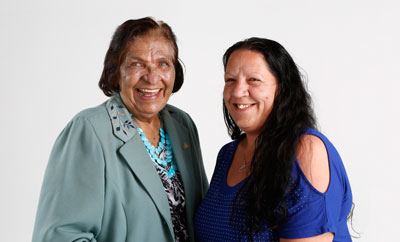Identification: It’s your right to a healthier life

Elder Aunty Lorelle Bird, from Deception Bay, with Caboolture
Indigenous Hospital Liaison Officer Michelle Pieper.
Metro North Hospital and Health Service (MNHHS) has launched a campaign during NAIDOC Week (3 – 10 July 2016) to highlight the importance of Aboriginal and Torres Strait Islander patients identifying when accessing their facilities.
The Accurate Indigenous Identification campaign is part of a push from the hospitals to improve the health outcomes of Queensland’s Aboriginal and Torres Strait Islander population.
MNHHS Aboriginal and Torres Strait Islander Health Unit Director Angela Scotney said the latest figures show the average life expectancy gap between Indigenous and Non-Indigenous people within the Metro North catchment was improving.
“The average life expectancy at birth for Indigenous people of Metro North HHS was 77.1 years and for non-indigenous people was 85.3 years, which is now a 8.2 year gap. This is compared to the rest of Queensland with the gap at 10.4 years for males and 8.9 years for females.
“While our figures show an improvement, it is still important that we do not become complacent and identify that there is still a significant gap and more hard work is needed to close the gap.”
She said the Accurate Indigenous Identification campaign would support the measurements of the Indigenous health status and the effectiveness of intervention programs.
“Identification is a topic especially close to my heart as our people suffer with many complicated conditions and quite often have several conditions at the one time.
“By identifying as Indigenous the clinician can be aware of these issues and screen for other conditions where there is a high prevalence. Holistic health care is so important and you cannot just treat a person with one condition when there can be many.”
Cultural Capability Officer Elwyn Henaway said it was important to tick the box to say you are of Aboriginal and/or Torres Strait Islander descent to receive the appropriate care.
“Identification is important for me as chronic disease now accounts for 30 per cent of Indigenous death rates. Chronic disease runs in my family and I have to make sure we get the screenings to check my children.
“By identifying, our mob has improved individual care through culturally capable health service delivery, and through referrals and linkages to services specifically for Aboriginal and Torres Strait Islander people.”
The campaign will run over the next three months and include identification t-shirts for consumers, stickers to prompt health professionals to initiate referrals to culturally appropriate services and a training package to educate MNHHS staff on the importance of Indigenous identification and the correct processes.
Staff, patients and community members are invited to learn more about the campaign at MNHHS NAIDOC Week events starting next week:
- The Prince Charles Hospital, Monday 4 July, Outside Breeze Café
- The Royal Brisbane and Women’s Hospital, Tuesday 5 July, Outside Education Centre
- Redcliffe Hospital, Monday 11 July, Garden Foundation Grounds
- Community, Indigenous and Subacute Services Family Fun Day, Tuesday 12 July, Brighton Health Campus
- Caboolture Hospital, Wednesday 13 July, Healing Garden
- Kilcoy Hospital, Friday 15 July, Hospital Grounds
